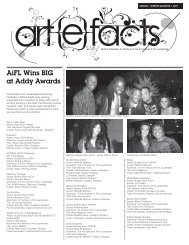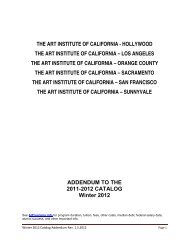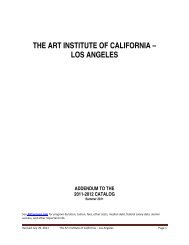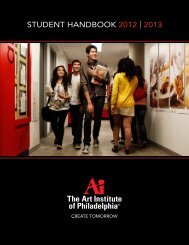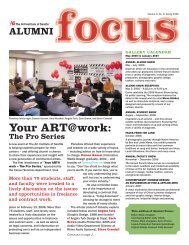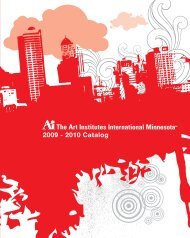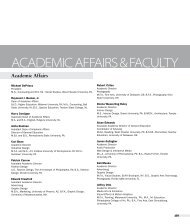2011-2013 CATALOG - The Art Institutes
2011-2013 CATALOG - The Art Institutes
2011-2013 CATALOG - The Art Institutes
Create successful ePaper yourself
Turn your PDF publications into a flip-book with our unique Google optimized e-Paper software.
6. Expulsion: <strong>The</strong> student will be expelled from <strong>The</strong><br />
<strong>Art</strong> Institute of Phoenix immediately. <strong>The</strong> student<br />
will not be permitted to continue his or her studies<br />
at <strong>The</strong> <strong>Art</strong> Institute of Phoenix and may not return<br />
to the college or to college-sponsored housing or<br />
activities at any time or for any reason.<br />
7. Restitution: Compensation for loss or damage<br />
to property leased, owned or controlled by the<br />
school. This may take the form of monetary or<br />
material replacement.<br />
<strong>The</strong> above list is only a general guideline. Some<br />
sanctions may be omitted, and other sanctions<br />
not listed above may be used.<br />
SECTION VII. DISCIPLINARY<br />
PROCEDURES.<br />
Complaint<br />
Any member of <strong>The</strong> <strong>Art</strong> Institute of Phoenix<br />
community may file a complaint against any student<br />
for misconduct or for otherwise being in violation of<br />
<strong>The</strong> <strong>Art</strong> Institute of Phoenix policies.<br />
1. <strong>The</strong> complaint shall be prepared in writing or<br />
in an incident report and directed to the Chief<br />
Conduct Officer or his/her delegate.<br />
2. <strong>The</strong> written complaint or incident report<br />
should include the nature of the offense, date,<br />
approximate time and location of incident. <strong>The</strong><br />
name of the victim, offender and any witness/s<br />
may be included.<br />
3. Complaints or incident reports should be<br />
submitted within 48 hours after the alleged<br />
violation occurred unless there are extenuating<br />
circumstances requiring a longer time frame.<br />
<strong>The</strong> Chief Conduct Officer or a delegate may review<br />
and investigate the complaint to determine if the<br />
allegations have factual merit, to identify violations of<br />
the student conduct policy, and to impose sanctions<br />
for such violations.<br />
Generally, the accused should be given the<br />
opportunity to tell his or her account of the situation<br />
and to provide this information, in writing, unless<br />
<strong>The</strong> <strong>Art</strong> Institute of Phoenix determines that the<br />
circumstances do not warrant disclosure of some or<br />
all of the facts.<br />
Search of Student’s Property<br />
Students have no expectation of privacy in their<br />
personal property while on campus. <strong>The</strong> <strong>Art</strong> Institute<br />
of Phoenix reserves the right to search the contents of<br />
students’ personal property or belongings at any time<br />
and for any reason, including when there is reasonable<br />
suspicion on the part of the Institute staff that a risk<br />
to the health, safety or welfare of students, and/or<br />
the school community exists and including searches<br />
pursuant to an investigation of potential wrong doing.<br />
This includes but is not limited to vehicles brought<br />
onto property leased, owned or controlled by the<br />
school, backpacks, portfolios and clothing. This policy<br />
also applies to student property in School-Sponsored<br />
Housing, student e-mail and/or computers.<br />
Notification and Determination of violations that<br />
warrant Disciplinary Meeting<br />
1. <strong>The</strong> Chief Conduct Officer or a delegate may<br />
choose to conduct a disciplinary meeting.<br />
Potential attendees include a student or students,<br />
the Chief Conduct Officer or his/her delegate<br />
and others who may have relevant information.<br />
<strong>The</strong> Student should receive advance notice of the<br />
allegations and the reason for the meeting. After<br />
the meeting,<br />
2. <strong>The</strong> Chief Conduct Officer or his/her delegate<br />
will determine whether it is more likely than<br />
not that a violation occurred, may a render and<br />
communicate the decision to the student in<br />
writing, which shall describe the violation and<br />
the sanctions imposed, if any, and the student’s<br />
right to appeal. If the Chief Conduct Officer<br />
determines that there was no violation, that<br />
decision may be documented in writing to the<br />
student as well.<br />
a) If a student fails to appear for the meeting,<br />
the Chief Conduct Officer or his/her delegate<br />
may make a determination of violations of<br />
<strong>The</strong> <strong>Art</strong> Institute of Phoenix policies on the<br />
basis of the information available, and impose<br />
sanctions for such violations.<br />
Notification and Determination of violations that<br />
warrant Disciplinary Hearing<br />
In some cases, involving serious violations, the Chief<br />
Conduct Officer or delegate, hereby referred to as<br />
“Hearing Officer”, in his or her sole discretion, may<br />
choose to assemble a disciplinary panel to adjudicate<br />
the process.<br />
1. <strong>The</strong> Hearing Officer may immediately (before<br />
a hearing takes place) remove the student<br />
from the campus community pursuant to an<br />
Interim Suspension until the Disciplinary Panel is<br />
convened. (see interim suspension)<br />
2. <strong>The</strong> Student should receive advance notice of the<br />
allegations and the reason for the meeting. A<br />
student may forgo attendance at the hearing and a<br />
determination of the sanction will be made by the<br />
Disciplinary Panel<br />
3. Hearings normally shall be conducted in private. <strong>The</strong><br />
Disciplinary Hearing is an academic hearing, not a<br />
legal hearing. <strong>The</strong>refore, legal counsel is not allowed<br />
at the hearing.<br />
4. <strong>The</strong> student may be accompanied by one person<br />
(family member, friend, etc) to provide support.<br />
<strong>The</strong> committee may prohibit from attending or<br />
remove any person who disrupts the proceedings<br />
of the committee<br />
5. In Hearings involving more than one student,<br />
the Hearing Officer, in his or her discretion, may<br />
permit the hearing concerning each student to be<br />
conducted separately.<br />
6. <strong>The</strong> Disciplinary Panel may hear from any person<br />
who may have relevant information and the Panel<br />
may review any documents presented to them.<br />
a. Pertinent records, documents and written<br />
statements may be considered by the Hearing<br />
Officer at his/her discretion<br />
b. <strong>The</strong> Disciplinary Panel may ask questions and<br />
may seek information not provided to it.<br />
7. <strong>The</strong> Disciplinary Panel may determine whether it is<br />
more likely than not that a violation occurred <strong>The</strong><br />
Panel should communicate to the Hearing Officer<br />
its decision and its recommended sanction, if any.<br />
8. After the Hearing, the Hearing Officer will<br />
issue a written decision to the accused student<br />
which identifies the accusations and the panel’s<br />
conclusions, any sanctions, and the student’s<br />
right of appeal.<br />
9. In general, the accused should have access to the<br />
documentation reviewed by the panel, however<br />
identifying names and information may be<br />
removed from the documentation when necessary<br />
to protect other student’s privacy rights.<br />
Disciplinary Panel<br />
A Disciplinary Panel may consist of members of <strong>The</strong><br />
<strong>Art</strong> Institute of Phoenix Executive Committee, Campus<br />
Staff, Faculty or Student Body. When students are<br />
permitted on the panel, the accused student should<br />
sign a form granting permission to release his/her<br />
educational records to a student serving on the<br />
panel. Failure to sign the permission constitutes an<br />
agreement to have no student on the panel.<br />
Administrative Interim Suspension<br />
Students may be administratively suspended on an<br />
interim basis when:<br />
1. serious allegations are being investigated<br />
2. serious allegations are pending before a<br />
disciplinary panel<br />
3. in advance of a disciplinary panel hearing; or<br />
4. when a student potentially poses a threat of<br />
harm to himself, to others, or to property of the<br />
Institute or a member of <strong>The</strong> <strong>Art</strong> Institute of<br />
Phoenix community<br />
During the interim suspension, students are denied<br />
access to college-sponsored housing and/or to the<br />
school (including classes, labs, library) and/or all other<br />
school activities or privileges for which the student<br />
might otherwise be eligible, as the Chief Conduct<br />
Officer or designee may determine to be appropriate.<br />
This interim suspension period should last no longer<br />
than three business days, and the Chief Conduct<br />
Officer or delegate may make reasonable provisions<br />
to provide for accommodations of a student in school<br />
sponsored housing.<br />
<strong>The</strong> interim suspension is not to be considered<br />
disciplinary, but it is a tool to separate potential<br />
adversaries until a reasoned decision can be made.<br />
SECTION VIII. APPEAL PROCEDURES.<br />
Students have a right to appeal disciplinary<br />
actions when they believe they have extenuating<br />
circumstances or believe to have been treated in an<br />
arbitrary or biased fashion or without adherence to<br />
<strong>The</strong> <strong>Art</strong> Institute of Phoenix policies and procedures.<br />
• During an appeal, the student should continue to<br />
obey the terms of the decision, i.e., a student who<br />
has been suspended from school may not be on<br />
school property, a student dismissed from School-<br />
Sponsored Housing must leave in accordance with<br />
the directions indicated in the decision.<br />
• <strong>The</strong> student must write a letter of appeal in<br />
the student’s own words, addressed to the<br />
President of <strong>The</strong> <strong>Art</strong> Institute of Phoenix or his/<br />
her delegate. This letter must clearly state the<br />
extenuating circumstances or the grounds for<br />
believing the decision was arbitrary or biased<br />
or that it was without adherence to <strong>The</strong> <strong>Art</strong><br />
Institute of Phoenix policies and procedures, and<br />
provide any supporting documentation. It must<br />
be delivered to the President or his/her delegate<br />
within seven calendar days following the student’s<br />
receipt of the decision.<br />
• Students should provide documentation to<br />
support the allegations of the appeal.<br />
• <strong>The</strong> President or his/her delegate may appoint<br />
an ad hoc committee to review appeals and make<br />
a recommendation regarding disposition of the<br />
appeal within 30 days of the date of receipt of<br />
the appeal. This committee will be comprised of<br />
faculty or staff members not involved in making<br />
the initial disciplinary decision.<br />
THE ART INSTITUTE OF PHOENIX <strong>2011</strong>-<strong>2013</strong> COURSE <strong>CATALOG</strong> 75






